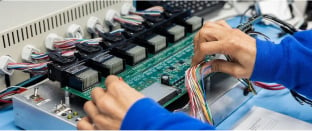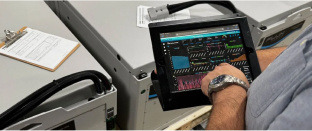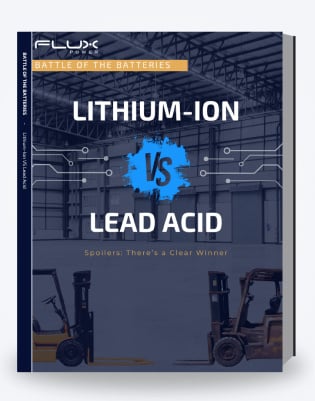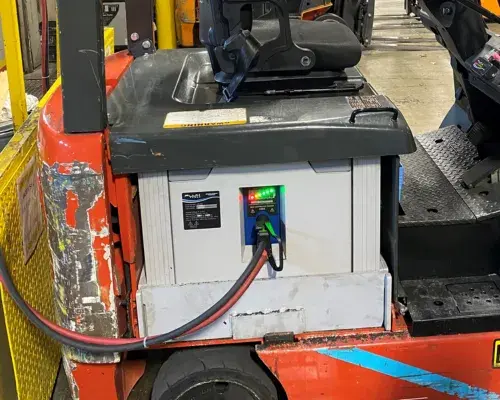When it comes to maintaining your forklift fleet or other battery-powered equipment, lithium-ion battery charging is just as important as the battery itself. An efficient and reliable charger can extend the life of your lithium forklift battery, reduce downtime, and optimize the performance of your equipment.In this FAQ guide, we'll cover the most important questions to ask when choosing the right battery charger for your needs, with insights from Oliver Stanbury, Owner of Stanbury Electrical Engineering.
- Why Is Choosing the Right Battery Charger Important?
Your battery charger is essential for ensuring your forklift or equipment maintains full operational capacity throughout the workday. As Oliver Stanbury explains, “Using the right charger will optimize the subsequent performance of your battery and vehicle. The right battery is important for storing energy and delivering it to the lift truck, but the charger's delivery of energy to the battery from the electric supply can have an equal impact on operational efficiency."
A poorly matched or low-quality charger can lead to:
- Shorter battery life
- Reduced run time per charge
- Overheating or undercharging
- Costly downtime or damage to equipment
Without reliable and effective charging, the battery’s state of charge will suffer, and eventually, the productivity of the truck will hurt fleet operations.
- What Are the Different Types of Battery Chargers?
There are three common types of power supplies used in industrial battery chargers:
- Ferroresonant Chargers
- SCR Controlled Chargers
- High-Frequency (HF) Chargers
Stanbury highlights that “Ferro and SCR are legacy technologies being displaced by HF chargers in many states due to efficiency requirements. HF chargers are more energy-efficient, improve battery performance, and enhance battery longevity, making them worth the premium for most users.”
Understanding the differences between these chargers is important. HF chargers are generally more efficient, providing better long-term benefits compared to older technologies.
- How Do I Know if a Charger is Compatible with My Battery?
Compatibility is critical when selecting a charger. Here are the key factors to consider:
- Battery Chemistry: Is your battery lead acid, lithium-ion, or another type? Different batteries require different chargers. For example, lithium-ion batteries have different charging profiles compared to lead acid batteries.
- Voltage: The charger’s output voltage must match the battery’s voltage. Using a charger with the wrong voltage can damage your battery or the charger itself. If your battery is 24V, ensure the charger is designed to charge 24V batteries.
- Ampere Rating: The amp rating of the charger should align with the battery's capacity and how quickly you need to charge it.
The key is to ensure that the charger’s output matches your battery’s voltage and capacity. Using a charger with the wrong specifications can lead to battery damage, reduced performance, or a complete inability to charge the battery.
- Can I Use One Charger for Different Battery Types?
While not all chargers are compatible with multiple battery chemistries, advanced chargers do exist. Stanbury explains, “With certain advanced charge controllers, it is possible to operate mixed fleets of batteries using the same charger. Some chargers offer flexibility to operate using a variety of different profile logics and communication platforms, allowing for fleets transitioning from lead acid to lithium to use the same charging station across battery types.”
For facilities with mixed battery chemistries or fleets in transition, investing in a charger that can handle multiple profiles can save on equipment costs and streamline operations.
- Why Is Temperature Monitoring Important in a Battery Charger?
Temperature has a significant impact on battery performance and lifespan. Overcharging or rapid charging can cause batteries to overheat, which can damage internal components, reduce efficiency, and shorten lifespan. A charger that monitors and regulates temperature prevents the battery from overheating and maintains optimal charging conditions. This feature is especially important for fast chargers and lithium-ion batteries, which are more sensitive to temperature fluctuations.
- Does the Length of the Charger Cables Matter?
Yes, cable length matters both for safety and efficiency. As Stanbury points out, “Cables must be long enough to comfortably reach the battery being charged. Cables that are too long add to electrical losses in the charging circuit and make cable management difficult, increasing the risk of breakage and costly downtime.”
Poorly managed cables can also be hazardous, posing risks of damage to both the charger and surrounding equipment. Ensure the cable length matches your setup without being overly long.
- What Features Should I Look for in a Charger?
Stanbury explains that “an MHE charger should have the same characteristics which are important for the industrial vehicle itself. It should be highly productive, very reliable, and very efficient. Once you have determined a particular line of chargers will deliver these characteristics you want to determine the speed your battery needs to be recharged at. This is a function of the vehicle usage schedule, battery capacity, and available plug-in periods that can be used to recharge.”
If you are unsure of these characteristics battery telematics offers great insights into vehicle usage, and what charge rates are required to support your application.
- What Is a Battery Management System (BMS)?
A Battery Management System (BMS) is a crucial feature for lithium-ion battery chargers. It monitors and manages the health of each cell within the battery, balancing them to ensure even charging. A BMS also controls charging rates, monitors temperature, and protects against overcharging, undercharging, and short circuits. A high-quality BMS ensures your lithium-ion battery performs at its best and lasts longer.
- Does the Price of a Charger Include Cables?
Not all chargers come with cables, and it’s important to check this before purchasing. Some manufacturers sell the charger and cables separately, while others offer them as a package. Be sure the cables you use are compatible with your battery and charger, and that they are the appropriate length for your workspace.
- What Are the Advantages of Lithium-Ion Battery Chargers?
Lithium-ion battery chargers offer several advantages over traditional lead acid chargers:
- Faster Charging: Lithium-ion chargers typically offer quicker charge times, reducing equipment downtime.
- Efficiency: Lithium-ion chargers are more energy-efficient, wasting less power during the charging process.
- Smarter Features: They often come with built-in Battery Management Systems (BMS) for enhanced safety and performance monitoring.
- Longer Battery Life: With proper charging and monitoring, lithium-ion batteries last longer and maintain consistent performance over time.
Conclusion
Selecting the right battery charger for your lithium-ion battery and equipment is essential to maintain the performance and longevity of your forklift or other equipment batteries. By considering compatibility, safety features, temperature monitoring, and whether a smart charger is needed, you can ensure that your battery stays in peak condition for as long as possible. Remember that a reliable charger is a small investment that can save you money and headaches in the long run.

Power Up Your Forklifts the Right Way—Faster, Safer, Smarter
Enter your email to get a free guide on finding the right charging solution to keep forklifts powered, safe, and performing their best.











